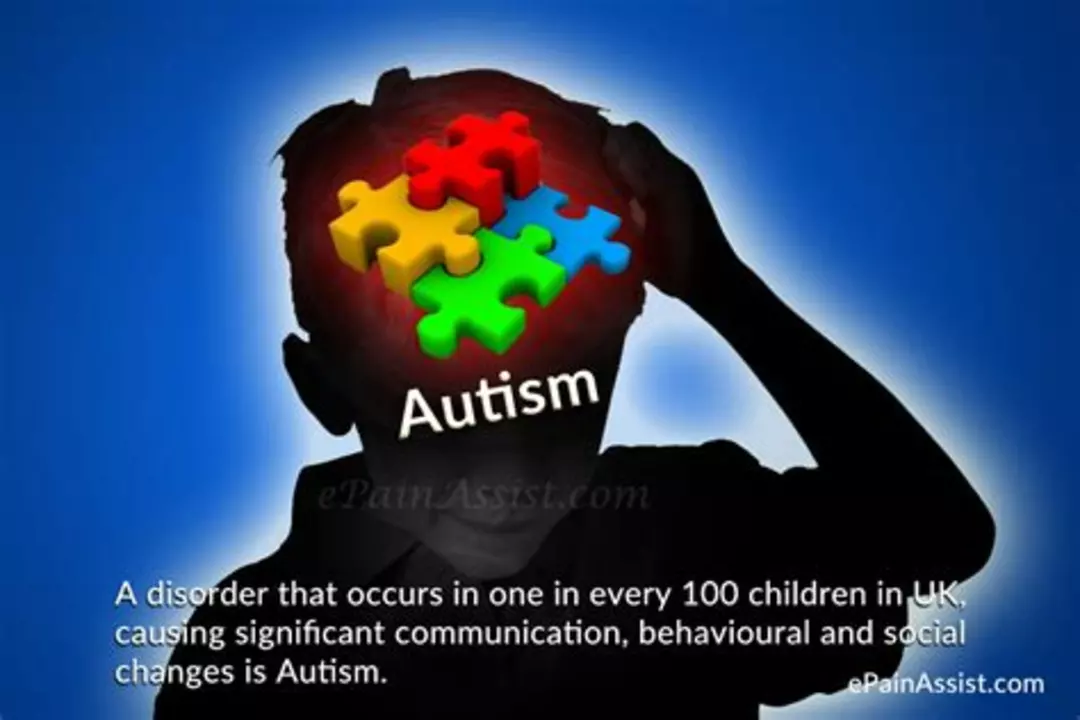Understanding Autism Spectrum Disorder and Intellectual Disabilities
Before diving into the connection between Autism Spectrum Disorder (ASD) and Intellectual Disabilities (ID), it is crucial to understand these two conditions individually. Autism Spectrum Disorder is a neurodevelopmental disorder characterized by difficulties in social interaction, communication, and repetitive behaviors. On the other hand, Intellectual Disabilities refer to a group of disorders characterized by significant limitations in intellectual functioning and adaptive behavior.
Although these conditions may seem distinct, there is a considerable overlap between them. In this article, we will explore different aspects of the connection between ASD and ID, including the prevalence of co-occurring conditions, shared symptoms, possible genetic factors, and the importance of early intervention and support.
Prevalence of Co-occurring ASD and ID
Studies have shown that a significant number of individuals with ASD also have an Intellectual Disability. According to the Centers for Disease Control and Prevention (CDC), nearly 31% of children with ASD have an Intellectual Disability, while another 23% have borderline intellectual functioning. This means that more than half of the children with ASD have some degree of intellectual impairment.
Conversely, it has been estimated that around 7-10% of individuals with ID also have ASD. These numbers highlight the importance of understanding the connection between these two conditions to provide appropriate support and intervention for those affected.
Shared Symptoms Between ASD and ID
While Autism Spectrum Disorder and Intellectual Disabilities are distinct conditions, they often share some common symptoms. These overlapping symptoms may include difficulties in communication, social interaction, and adaptive behavior. For instance, both individuals with ASD and those with ID may struggle with understanding social cues, maintaining eye contact, or initiating conversations.
Moreover, individuals with both ASD and ID often have challenges in problem-solving, planning, and organizing, as well as difficulties in daily living activities such as self-care, safety awareness, and self-direction. This overlap in symptoms can make it challenging to differentiate between the two conditions, especially in young children.
Genetic Factors and Their Influence
Recent research has suggested that there may be genetic factors contributing to the connection between Autism Spectrum Disorder and Intellectual Disabilities. Some of the known genetic syndromes associated with both ASD and ID include Fragile X Syndrome, Rett Syndrome, and Down Syndrome. However, these known syndromes account for only a small fraction of cases, and researchers believe that there may be many other yet undiscovered genetic factors contributing to the co-occurrence of ASD and ID.
Furthermore, studies have shown that siblings of individuals with ASD are at a higher risk of developing both ASD and Intellectual Disabilities, indicating a possible genetic link between the two conditions. As the research in this area continues to grow, we may gain a better understanding of the genetic factors underlying the connection between ASD and ID.
Early Intervention and Support
Early intervention is critical for individuals with ASD, ID, or both, as it can significantly improve their outcomes and quality of life. Early identification of these conditions allows for the implementation of targeted interventions and support services, which can help develop essential skills, reduce challenging behaviors, and promote social and emotional well-being.
For children with co-occurring ASD and ID, a combination of evidence-based interventions tailored to address their unique needs is crucial. These may include behavioral therapy, speech and language therapy, occupational therapy, and social skills training, among others. In addition, appropriate educational supports, such as individualized education plans (IEPs) and inclusive classrooms, can further enhance their learning and development.
The Importance of a Comprehensive Assessment
Given the overlap in symptoms and the high prevalence of co-occurring ASD and ID, a comprehensive assessment is essential to ensure an accurate diagnosis and appropriate support. A thorough evaluation should include assessments of cognitive functioning, adaptive behavior, communication skills, and social-emotional functioning, as well as a detailed developmental history.
Collaboration between various professionals, such as psychologists, speech and language therapists, occupational therapists, and educators, is also crucial to obtain a complete picture of the individual's strengths and challenges. This comprehensive approach can help differentiate between ASD and ID, identify co-occurring conditions, and guide the development of individualized interventions and support plans.
Challenges in Differentiating Between ASD and ID
As mentioned earlier, differentiating between Autism Spectrum Disorder and Intellectual Disabilities can be challenging due to the overlap in symptoms and the high prevalence of co-occurring conditions. In some cases, individuals may receive a diagnosis of ID before being identified as having ASD, while others may be diagnosed with ASD without considering the possibility of an Intellectual Disability.
This underscores the importance of a comprehensive assessment and a multidisciplinary approach in accurately identifying and supporting individuals with these conditions. Accurate diagnosis is crucial, as the interventions and support strategies for ASD and ID may differ and should be tailored to the specific needs of each individual.
The Role of Family and Caregivers
Family members and caregivers play a vital role in the lives of individuals with Autism Spectrum Disorder and Intellectual Disabilities. They can provide invaluable support, encouragement, and advocacy to help their loved ones reach their full potential. In addition, they can collaborate with professionals and educators to ensure appropriate interventions and support services are in place.
It is also essential for family members and caregivers to educate themselves about the connection between ASD and ID and the unique challenges faced by individuals with co-occurring conditions. By gaining a better understanding of these conditions, they can better support their loved ones and contribute to their overall well-being and success.








Meigan Chiu
May 13, 2023 AT 17:29Despite the thorough overview, the CDC figures cited are from a 2016‑2018 cohort, so they might not reflect the latest epidemiological shifts. Recent surveys suggest the co‑occurrence rate hovers closer to 20 % rather than the 31 % mentioned, especially in regions with robust early‑screening programs. Moreover, the article glosses over the fact that “borderline intellectual functioning” isn’t a monolithic category; it spans a wide IQ spectrum and can mask distinct developmental trajectories. It would be prudent to differentiate between mild and moderate ID when discussing intervention strategies. Finally, a brief note on the diagnostic criteria revisions in DSM‑5 would strengthen the context.
Patricia Hicks
May 25, 2023 AT 17:29Reading through this piece feels like a breath of fresh air because it finally acknowledges how intertwined autism and intellectual disabilities truly are, and that recognition is the first step toward real change. It’s uplifting to see the emphasis on early intervention, because catching these signs sooner rather than later can open doors to therapies that genuinely transform lives. Families deserve to hear that there’s a whole toolbox of evidence‑based approaches-from ABA and speech therapy to sensory integration and social skills groups-and that these aren’t one‑size‑fits‑all solutions but can be blended to fit each child’s unique profile. The article’s reminder that inclusive classrooms and individualized education plans can make a world of difference resonates deeply, especially when educators are trained to celebrate neurodiversity rather than merely accommodate it. Moreover, the discussion about genetic overlaps, like Fragile X and Rett, sparks curiosity while also tempering expectations, reminding us that genetics is a piece of the puzzle, not the whole picture. By highlighting sibling risk, the piece underscores the importance of family‑wide support and counseling, which can alleviate anxiety and foster proactive monitoring. It’s also encouraging to read about multidisciplinary teams-psychologists, OT, speech‑language pathologists, and teachers-working hand‑in‑hand, because collaboration breaks down silos and ensures that interventions reinforce each other. The call for comprehensive assessments is spot‑on; thorough evaluations that look at cognition, adaptive behavior, communication, and social‑emotional health can prevent misdiagnoses and set the stage for tailored support. Importantly, the narrative doesn’t stay stuck in clinical jargon; it brings forward real‑world stories of families who have seen progress, which can inspire others who might feel overwhelmed. The optimism shines through when the article mentions that many children, with the right mix of services and love, go on to lead fulfilling, autonomous lives-proof that early, coordinated effort truly pays off. Lastly, the piece gently nudges policymakers to allocate resources for training and services, a reminder that systemic change is as vital as individual therapy. All in all, this article not only educates but also lifts spirits, offering hope that with compassion, science, and community, the challenges of co‑occurring ASD and ID can be met head‑on. Keep sharing these insights, because awareness fuels advocacy, and advocacy drives funding for research and services. When communities rally around these families, stigma fades, and inclusion becomes the norm rather than the exception. So, let’s keep the conversation alive, celebrate each small victory, and push for even richer support structures worldwide.
Quiana Huff
June 6, 2023 AT 17:29Data‑driven approach rocks! 🚀
William Nonnemacher
June 18, 2023 AT 17:29The article oversimplifies complex genetics it’s lazy. No nuance on polygenic risk.
Alex Ramos
June 30, 2023 AT 17:29While I understand the frustration, it's important to acknowledge that summarizing vast research in a readable format does require some condensation; however, the author could have included footnotes or links-perhaps a brief table of known syndromes would have sufficed!
Mita Son
July 12, 2023 AT 17:29Honestly, reading this felt like a rollercoaster of emotions-one moment I was nodding in agreement, the next I was thinking, “Wait, did they really say that?” It’s definetly a step forward, but there’s still a long way to go before we truly grasp the full picture.
ariel javier
July 24, 2023 AT 17:29The presented statistics, albeit cited, lack methodological transparency; consequently, any policy recommendation derived therefrom remains speculative at best.
Bryan L
August 5, 2023 AT 17:29Great points, especially about multidisciplinary teamwork 😊. It’s reassuring to see researchers highlighting the real‑world impact on families; that empathy makes a huge difference.